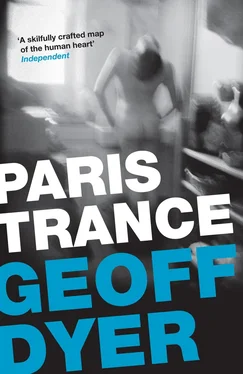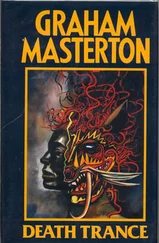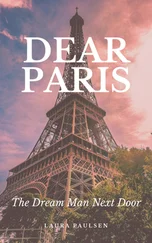‘You see what an inconsequential film it will be?’ said Luke when they got out at Opéra. Nicole laughed. She was wearing a white dress, plimsolls, Luke’s sunglasses (the ones she had mislaid), a single bracelet. It was hot. There were a few scars of cloud; otherwise the sky was empty blue. On rue de la Paix Luke went into an alimentation and came out with two plastic bottles of fresh orange, one of which he threw to Nicole. She caught it, just. Luke was wearing a linen shirt, jeans. She watched him unscrew the bottle of orange and gulp it down as if he were pouring sun down his throat.
The park was packed with tourists. Litter bins were overflowing with Coke cans, buzzing with wasps. The grass had not yet been scorched by the summer heat, there were not too many cigarette butts in evidence. A group of boys were playing football. The ball bounced over to Nicole and she toe-poked it back. Sun dazzled the statues. To Luke’s surprise and disappointment the centaur was no longer there. It too had left the city for the summer: for restoration, a plaque explained.
Since seeing Luke that afternoon in London, and while writing this account of the period when our lives overlapped, I have thought constantly about what happened to him, have come up against that ‘big why’ again and again.
I think now that certain destinies are the opposite of manifest: ingrown, let’s say. Hidden, rarely revealing themselves, probably not even felt as a force, they work like the process or instinct that urges a seed in the soil in the direction of the light: as strong, silent and invisible — as imperceptible — as that. In Luke’s case, something took him away from the light, from what he most wanted and loved. As if the seed’s impulse towards the light becomes warped or damaged so that it takes itself deeper and deeper into the soil. As it buries itself deeper so it redoubles its efforts to attain the light. But in doing so, like the deer we saw exhausting itself by struggling in a trap, it succeeds only in burying itself still further. Eventually the urge towards the light withers because, as if through the workings of some last-ditch, built-in fail-safe, only by ceasing to struggle can it hope to survive. At some very late stage it senses that it is its longings which have condemned it. And so it remains where it is, a faint pulse of life in the darkness, directionless, not moving.
I think Luke could feel something tugging him, exerting not an attraction but a pull that was very faint and yet so insistent that he began to wonder if, by giving in to it, he might have found a way of being faithful to his destiny. Maybe some truth would be revealed to him that was denied to happier, more contented people. Even as he thought this he must have suspected that such a truth would be distorted, rendered false, because it would, inevitably, be encrusted by bitterness. We all want to believe that truth is incompatible with bitterness but this is wishful thinking. Perhaps truth is bitter, mean, miserly. The hankering to make of truth something ennobling and pure is itself a falsification. Perhaps it is actually the truth itself that twists you, that is twisted.
Obviously things could have turned out differently for Luke, could have worked out better. But by letting things occur as they did he believed he was penetrating more deeply into himself, getting closer to his core. Luke fell short of what he was capable of. He could have been many things, could have achieved more than he did. To all outward appearances he failed: he failed to keep the woman he loved, to pursue a career, to raise a family, to be happy. All of the things he associated with happiness came to be lodged absolutely in his past. But there was a sense, I think, in which he did fulfil his destiny. There are people who are destined to have lives like this and, in some way, his falling short was a kind of triumph; he was being faithful to some part of himself, to his destiny.
There are all sorts of propensities in people; we tend to look only at the positive side — their potential for success, for happiness — but there are other kinds of negative potential: the potential for wasting the talents we are given, for blighting our prospects of happiness.
So, as he sits there, staring at the TV that has been on all day, waiting for time to pass, as he looks at the bed where he has slept every night, or at the crumbs of bread scattered over the kitchen table, as he postpones for a little while longer the first drink of the day, or decides that he has waited long enough and opens the first bottle — perhaps he feels that at some level he has achieved his destiny, that he has been true to some part of himself, has touched some possibility which had been latent in him from his earliest beginnings. Perhaps he feels at home in himself.
I can imagine him sitting there, his mouth numbed by beer, knowing that he has ruined his whole life, that nothing will remain of him when he dies — no book, no children — and wanting nothing to be any different, accepting it. I can even imagine him almost happy.
Alex and Luke had a meeting with Lazare who gave them a list of things he wanted done to the house, how he wanted them done. There was no phone, he said, but they should call whenever they got a chance, to let him know they weren’t ruining the place.
‘And don’t be surprised if I turn up one day to check on you.’ These were his final words on the subject.
As at Christmas they loaded up Sahra’s car and found that they were once again pressed for space. They bought a roof rack but even with that piled dangerously high there was not enough room for everything they needed. The bikes were the real problem. Not taking them was unthinkable so they arranged to send them on ahead by train. They threw out other things that weren’t strictly necessary, decided they were essential after all and crammed half of them back on to the roof rack.
‘What are we going to do about Spunky?’ said Nicole. ‘We can’t leave him.’
‘You’re right. We’ll have to take him.’
He was waiting for them in the apartment. Luke kicked him in the face and sent him floating across the room.
‘Luke!’
‘It’s for his own good. To stun him.’ Luke picked up their dog and put his arm around his neck.
‘I can’t look,’ said Nicole. Luke reached under him and pulled the stopper from his stomach. Spunk sagged and shrivelled. Nicole listened to the long hiss of air as Luke squeezed the life from him.
‘He feels I’m letting him down,’ said Luke.
When Nicole turned round he was holding a lumpy square of black and white plastic, tied with pink ribbon.
They had hoped to leave in the afternoon but by the time they had taken the bicycles to the station and finished loading, unloading and re-loading it was growing dark. This was probably for the best, Alex thought. The already defective car looked so unroadworthy it would be more prudent to drive at night when there was less chance of getting pulled over. They were further delayed by Daniel who — though the women knew nothing of this arrangement — was supposed to be getting some acid for them but, two hours later than promised, he called to say that it was impossible. He’d have to post it on to them.
It was almost eleven when they finally set out. Even at that late hour there was still a bluish tinge to the sky: the sharp indigo that is unimaginable except as a backdrop for petrol stations, signs, neon. The moon was in orbit. Sahra was driving. Since their top speed was only 75 k.p.h. and they wanted, in any case, to avoid being towed off the autoroute in the event of a breakdown, they stayed on B roads, passing through villages whose backs seemed resolutely turned away from the road, wanting nothing to do with it. Houses did not seem asleep so much as barricaded in. They drove through the night, stopping for fuel whenever they found a petrol station that was open. Sahra had made a flask of tea which they passed round, sipping in the faint light of what Alex liked to call the instrument panel.
Читать дальше












